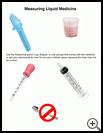
Cold Medicines
________________________________________________________________________
KEY POINTS
- Cold medicines often contain more than one ingredient, such as decongestants, antihistamines, pain relievers, and cough medicines. They can be used to treat more than one symptom. Read the labels and buy products that have only the ingredients that you need.
- Make sure you know how and when to take your medicine. Do not take more than you are supposed to take.
- Ask your healthcare provider or pharmacist what side effects the medicine may cause, what you should do if you have side effects, and if there will be an interaction with your regular medicines.
________________________________________________________________________
What are cold medicines?
Symptoms of the common cold start gradually over several days and usually last about two weeks. Symptoms may include sneezing, a stuffy or runny nose, sore throat, cough, watery eyes, mild headache, or body aches. A cold will go away on its own without treatment. However, there are many nonprescription products that may help relieve some of the symptoms of a cold. Cold medicines often contain more than one ingredient and are used to treat more than one symptom. Read the labels and buy products that have only the ingredients that you need. If you are not sure which medicine is best, ask your pharmacist.
How do they work?
Decongestants reduce swelling in your nose and sinuses. They may also lessen the amount of mucus made by your nose. If you use nasal spray decongestants more often than directed, your stuffy nose may get worse.
Antihistamines block the effect of histamine. Histamine is a chemical your body makes when you have an allergic reaction. Antihistamines are most often used to treat itchy or watery eyes or a stuffy or runny nose caused by an allergy. Antihistamines may not help a stuffy or runny nose caused by a cold. They can make mucus thick and dry.
Mucolytics are medicines that make mucus thinner so that it is easier to cough up out of your throat and lungs.
Expectorants are cough medicines that may help to keep the mucus thin and bring up mucus from the lungs when you cough. This may relieve chest congestion and make it easier to breathe.
Cough suppressants (antitussives) are medicines that lessen the urge to cough. They may give relief from a dry, hacking cough. If you have a cough that is wet sounding and produces mucus, it is important for you to cough the mucus up out of your lungs. For this reason, cough suppressants are not recommended for a wet sounding cough.
Fever and pain relievers, such as acetaminophen, aspirin, or other nonsteroidal anti-inflammatory drugs (NSAIDs), are often included in cold medicine. Read labels carefully to avoid taking more medicine than you need.
What else do I need to know about cold medicines?
- Talk to your healthcare provider if your symptoms start suddenly or you have severe symptoms. This may mean you have something more serious than a cold.
- Follow the directions that come with your medicine, including information about food or alcohol. Make sure you know how and when to take your medicine. Do not take more than you are supposed to take.
- Try to get all of your medicine at the same place. Your pharmacist can help make sure that all of your medicines are safe to take together.
- Keep a list of your medicines with you. List all of the prescription medicines, nonprescription medicines, supplements, natural remedies, and vitamins that you take. Tell all healthcare providers who treat you about all of the products you are taking.
- Many medicines have side effects. A side effect is a symptom or problem that is caused by the medicine. Ask your healthcare provider or pharmacist what side effects the medicine may cause, what you should do if you have side effects, and if there will be an interaction with your regular medicines.
- Nonsteroidal anti-inflammatory medicines (NSAIDs), such as ibuprofen, naproxen, and aspirin, may cause stomach bleeding and other problems. These risks increase with age. Read the label and take as directed. Unless recommended by your healthcare provider, do not take them for more than 10 days for any reason.
- Acetaminophen may cause liver damage or other problems. Unless recommended by your provider, don't take more than 3000 milligrams (mg) in 24 hours. To make sure you don’t take too much, check other medicines you take to see if they also contain acetaminophen. Ask your provider if you need to avoid drinking alcohol while taking this medicine.
If you have any questions, ask your healthcare provider or pharmacist for more information. Be sure to keep all appointments for provider visits or tests.


